Fleurs du Mal Magazine


Paul Klee
(1879-1940)
Kurzes Leben
Kurzes Leben
Saures Streben
Viel Verdruß
malen muß
verschämt
vergrämt
Riesennatur
Überpartitur
Klavierstuhl hocken
Schütteln die Locken
Paul Klee Gedicht, 1901
fleursdumal.nl magazine
More in: Archive K-L, Expressionism, Klee, Paul
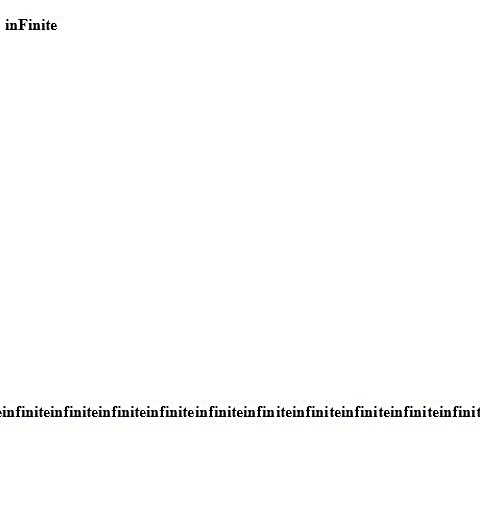
 John Reinhart: An arsonist by trade, eccentric by avocation, John Reinhart lives in Colorado with his wife and children, and beasts aplenty, including a dog, cat, duck, goats, chickens, and probably mice. His poetry has recently been published in Interfictions, Star*Line, Moon Pigeon Press, and Charles Christian’s Grievous Angel. More of his work is available at http://home.hampshire.edu/~jcr00/reinhart.html
John Reinhart: An arsonist by trade, eccentric by avocation, John Reinhart lives in Colorado with his wife and children, and beasts aplenty, including a dog, cat, duck, goats, chickens, and probably mice. His poetry has recently been published in Interfictions, Star*Line, Moon Pigeon Press, and Charles Christian’s Grievous Angel. More of his work is available at http://home.hampshire.edu/~jcr00/reinhart.html
John Reinhart: inFinite
johnreinhart@hotmail.com
Arsonist, Versifier
digital magazine fleursdumal.nl
More in: *Concrete + Visual Poetry P-T, Archive Q-R, John Reinhart, Reinhart, John
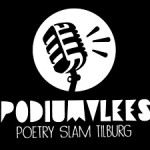 Verzen Versus Verzen brengt hiphop en poëzie tijdens cultuurnacht in de Hall of Fame Tilburg
Verzen Versus Verzen brengt hiphop en poëzie tijdens cultuurnacht in de Hall of Fame Tilburg
Tijdens de cultuurnacht op zaterdag 24 oktober vindt in de Hall of Fame Verzen Versus Verzen plaats, met daarin de stedelijke finale van de Tilburgse Poetry Slam Podiumvlees. Maar dat is niet het enige, want speciaal voor de Tilburgse cultuurnacht slaan Hall Of Fame, Podiumvlees en artiestenbureau To The Max de handen ineen om Poetry en Hiphop bij elkaar te brengen. Deze twee stromingen hebben veel raakvlakken met elkaar. Dat betekent dat u niet alleen kunt kijken en luisteren naar poëzie, maar ook naar een aantal getalenteerde hiphop en spoken word acts. Verzen Versus Verzen begint om 20 uur en de toegang is gratis. De Hall of Fame is gevestigd aan de Burgemeester Bokxlaan 6 in Tilburg.
In de tweede Stedelijke Finale van Podiumvlees gaan de winnaars van de vier voorrondes, Yannick Moyson, Kevin Amse, Von Solo en Glenn Markesteyn de strijd met elkaar aan. Op het spel staat een plaats in het Nederlands Kampioenschap Poetry Slam, dat in januari 2015 gehouden wordt in Utrecht. De dichters worden beoordeeld door een vakjury en een publieksjury.
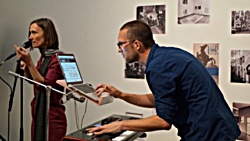 Tijdens deze avond presenteert To The Max een aantal getalenteerde hiphopacts. Met Vin Arge, De Grot (foto), Steev en Hidden Village wordt er toegewerkt naar een clubnacht waarbij Yung Amadeus en Dj Bowie de tent op zijn kop zetten. Je kunt niet anders dan losgaan!
Tijdens deze avond presenteert To The Max een aantal getalenteerde hiphopacts. Met Vin Arge, De Grot (foto), Steev en Hidden Village wordt er toegewerkt naar een clubnacht waarbij Yung Amadeus en Dj Bowie de tent op zijn kop zetten. Je kunt niet anders dan losgaan!
Podiumvlees is een initiatief van Stadsdichter van Tilburg Martin Beversluis en Nachtdichter Daan Taks. Zij gaan ook komend seizoen door met het organiseren van Podiumvlees. Daarom is Podiumvlees nog altijd op zoek naar nieuwe deelnemers. Wie meer informatie wil, kan op facebook terecht: www.facebook.com/podiumvlees
DIGITAL MAGAZINE FLEURSDUMAL.NL
More in: Art & Literature News, City Poets / Stadsdichters, MUSIC, STREET POETRY, THEATRE

Geschrokken veerde het doodzieke kind op en antwoordde met een kreet die het schreeuwen van de Azurri’s overstemde en alle andere geluiden uitveegde. Alleen de galmende kreet van de jongen vulde het plein, kaatste op en neer tussen de gevels, ebde langzaam weg in de straatjes en liet een vreemde stilte achter, die zo huiveringwekkend was dat Kaffa een koude rilling over zijn rug voelde lopen.
Hij zag dat de meisjes Azurri hun ogen ver openhielden en angstig naar de stilte luisterden, die al snel werd verbroken door het gemummel van opoe Ramesz, waarmee de alledaagsheid op het plein terugkeerde. De timmerman, die ongevoelig bleef voor wat er gebeurde, haalde een ladder onder de houtkrullen in zijn werkplaats tevoorschijn. Met veel tegenzin liep hij, onder het gewicht van de ladder door de knieën knikkend, naar de kerk. Schoof de ladder tegen de muur en klom omhoog, oog in oog komend met de heiligen in de gebrandschilderde ramen. Tot op het dak. Leek hij voortdurend om te vallen wanneer hij op de begane grond liep, nu viel alle onhandigheid van hem af. Hij liep als een kat door de goot, klom behendig tegen de pannen op, tot op de nok van het dak. Daar nam hij plaats in ruiterzit en bekeek vanaf zijn hoge positie het plein. De meisjes Azurri stonden in een kring rond Kaffa, wachtend op het flitsen van het mes. Vlak voor zijn ogen zag Kaffa hun beweeglijke lijven. Bruin van de zon. Nog glinsterend van het water. Hun natte broekjes plakten tegen hun billen. Hij rook de zoete geur van hun huid, hun natte haren. Hij zou hun zachte vel willen strelen. Hij werd helemaal warm van de gedachte. Zijn hand leek te rillen. Hij moest het mes vaster tussen zijn vingers klemmen om het niet weg te laten schieten. Jacob Ramesz dook op uit het donkere gat van zijn kot, een kop koffie voor zijn vrouw in de hand. Het enige wat hij haar te bieden had, ook al zou het haveloze mensje een uitgebreide maaltijd kunnen gebruiken. Zonder morsen dronk ze de gloeiend hete drank in één teug op. Vanbinnen moest ze van ijzer zijn. De koffie bleek haar goed te bekomen. Haar wezenloze ogen straalden en ze stootte tevreden kirgeluidjes uit, als een kip die klaarkwam bij het leggen van een ei. Jacob Ramesz zag dat de meisjes Azurri beurtelings naar het dak van de kerk en naar Kaffa keken. Tot zijn verbazing zag hij de timmerman op de nok zitten, als een ruiter te paard. Waar haalde de man de moed vandaan? De timmerman merkte dat de vlooientemmer naar hem keek en stak zijn vuisten naar hem uit. Jacob Ramesz werd daar koud noch warm van, want zijn hele aandacht werd opgeëist door Kaffa, die met een spelletje landverbeuren wilde beginnen. Tussen de benen van de meisjes door zag hij de in het zand getekende landen. Jacobs handen jeukten bij de gedachte aan het spel. Hij kwam dichterbij. Die gek leek nu wat toegeeflijker. Tenminste, hij hield hem niet meer met zijn ogen op afstand. Kwam het door de nederlaag die hij tegen Azurri had geleden? Wat was er toch met Kaffa aan de hand? Hij deed heel anders dan gewoonlijk. Heel onzeker. Dat kon nooit alleen het gevolg zijn van dat ene verlies. Het moest wat in hemzelf zijn. Iets wat zijn kop op hol bracht.
Ton van Reen: Landverbeuren (51)
wordt vervolgd
fleursdumal.nl magazine
More in: - Landverbeuren, Reen, Ton van
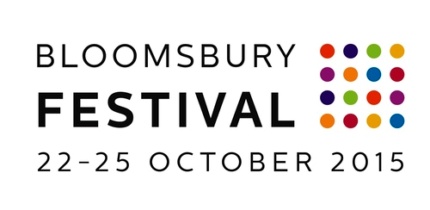
Bloomsbury Festival London
22 – 25 october 2015
Bloomsbury has long been an area associated with stories. Writers such as Charles Dickens, Virginia Woolf, J. M. Barrie and Dorothy L. Sayers all lived in the surrounding streets, often using them as settings for their novels.
Established in 2006, Bloomsbury Festival is a creative explosion of performance, arts, music and heritage events held in the streets, parks, museums, galleries, laboratories and public and private buildings of one of London’s most vibrant cultural quarters.
This area has a unique blend of academic institutions, businesses, cultural organisations and diverse communities. The Festival celebrates the best of Bloomsbury and its pioneering attitude. We’re not just a showcase for the area – we act as a catalyst to bring together artists and academics, scientists and dancers, or musicians and publishers, to make new projects and to inspire and learn from each other.
Bloomsbury Festival works with many large and small partners to create and deliver the annual Festival programme. Each year, it attracts an audience of around 50,000 people.
The Festival also delivers community engagement projects which give a voice and new skills to young people, older people and disabled people. Outside of the Festival period, the festival delivers projects such as the ‘Festival in a Box’ into care homes.
Above all, the festival aims to be enlivening, engaging, entertaining, and fun!
Museum By Candlelight at Charles Dickens Museum
Symphonic Illuminations – Goodensemble at Goodenough College
Phos at Various Locations
Light Up Store Street at Store Street
Living, Thinking, Looking – An Evening with Siri Hustvedt at Mary Ward House
John Hegley – Animal Alphaboat at Grant Museum of Zoology
Nostalgia for the light at Curzon Bloomsbury
The Tempest for Children with Autism and Their Families at Bloomsbury Theatre
ENO Know The Show Workshop: The Force of Destiny at Goodenough College
26 Pairs of Eyes – a Torchlit performance at Foundling Museum
Public Address: The Soap Box Tour at Bloomsbury Theatre
fleursdumal.nl magazine
More in: Art & Literature News, FDM in London, MUSIC, THEATRE

Overvloed
In de naslaap waad ik langzaam water
in. Dat doe ik nooit. Als ik me druipend
afvraag wat ik hier te doen sta verrijs jij.
Met het jonge slanke lichaam dat ik ken
van oude foto’s, gekartelrand en al, maar
met het hoofd dat ik zo zachtjes streelde
toen je bijna aan je laatste adem. Weet je
nog? Je glimlacht. “Wat krijgen we nou?
Jij gaf toch helemaal niets om zwemmen,
jongen?” zeg je. En je drukt me nat tegen
je borst die zo op de mijne lijkt. “Dag pa,”
zeg ik. “Dag papa. Waar ben je al die tijd?”
Bert Bevers
Berlimpahan
Ketika saya hampir bangun tidur, perlahan saya menyeberang
dalam air. Tidak biasanya saya lakukan itu. Jika saya, basah,
bertanya pada diri sendiri apa yang saya lakukan disini,
kamu bangkit, dengan tubuh yang muda dan kurus
yang saya kenal dari photo bergerigi, namun
dengan wajah tua yang saya belai begitu lembut
tatkala kamu dalam nafas yang terakhir. Masihkah
kamu ingat? Kamu tersenyum. “Apa itu?
Kamu toh sama sekali tidak suka berenang,
bocah?” katamu. Dan mendekapku kamu dalam dadamu
yang basah dan sama persis seperti dadaku. “Salam pak,”
kataku. “Salam ayah. Dimana kamu selama ini?”
Gedicht Bert Bevers
Vertaald naar het Indonesisch door Siti Wahyuningsih & Albert Hagenaars
fleursdumal.nl magazine
More in: Archive A-B, Overvloed, TRANSLATION ARCHIVE
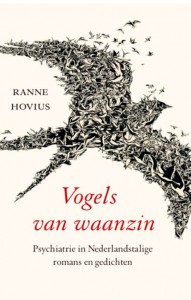
Museum Dr. Guislain
Jozef Guislainstraat 43
B-9000 Gent
Lezing op 22.10.2015
Ranne Hovius
boekpresentatie Vogels van Waanzin
Vele schrijvers zijn met de psychiatrie in aanraking geweest of schrijven over de zielenroerselen van psychiater en patiënt. In Vogels van waanzin vertelt Ranne Hovius op fascinerende wijze over het kruispunt van psychiatrie en literatuur. Bestaat er een band tussen creativiteit en waanzin? Hoe zijn ontwikkelingen in de psychiatrie in verhalen en gedichten terug te vinden? Hoe is een psychose te beschrijven?
Hovius bespreekt gekte en genialiteit in het leven en werk van Nederlandse en Vlaamse schrijvers zoals Gerrit Achterberg, Maarten Biesheuvel, Peter Buwalda, Hugo Claus, Hella Haasse, Kristien Hemmerechts, Willem Frederik Hermans, Myrthe van der Meer, Harry Mulisch, Gerard Reve, Heleen van Royen en Rogi Wieg. Op 22 oktober presenteert ze haar nieuwste boek in het Museum Dr. Guislain.
De boekvoorstelling vindt plaats in het Museum Dr. Guislain om 20u. De kostprijs is 5 euro.
Uitgeverij Nieuwerzijds Amsterdam
Vogels van waanzin
Psychiatrie in Nederlandstalige romans en gedichten
Ranne Hovius
ISBN 9789057124426
254 pag. 2015 – Paperback – € 19.95
fleursdumal.nl magazine
More in: - Book News, Art & Literature News, DICTIONARY OF IDEAS
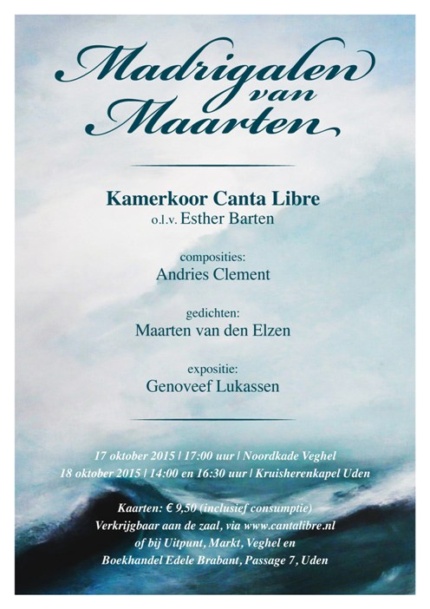
Op 17 en 18 oktober gaat Cantalibre een nieuwe uitdaging aan. Ze gaan de Madrigalen van Maarten van den Elzen vertolken van de Nederlandse componist Andries Clement. In deze voorstelling combineren ze de zangkunst met gedichten van de bekende Udense dichter Maarten van den Elzen. Hij zal werken uit zijn laatste dichtbundel voordragen. Het wordt een beleving waarin muziek en gedichten elkaar versterken.
In de Madrigalen van Maarten zingt Cantalibre 10 gedichten die op muziek gezet zijn door Andries Clement. Voor de kenners de hedendaagse componist die voornamelijk voor á capella koren componeert. Clement begon na zijn carriére als directeur van het Tilburgse conservatorium met het componeren. Zijn composities zijn voor de zangstem gemaakt. De presentatie van de madrigalen is door dirigent Esther Barten op een creatieve manier ingevuld.
Na afloop kunnen de gasten met een glaasje in de hand nog gezellig napraten met elkaar. De expositie van de Udense kunstenares Genoveef Lukassen, draagt daaraan bij.
Canta Libre vertolkt de Madrigalen van Maarten van den Elzen
Er zijn drie voorstellingen:
De premiére vindt plaats op 17 oktober 2015 om 17:00 uur op de Noordkade in Veghel.
Zondag op 18 oktober om 14:00 uur en om 16:30 op in de Kruisherenkapel in Uden.
# Meer informatie op website Cantalibre
fleursdumal.nl magazine
More in: Archive E-F, Art & Literature News, Elzen, Maarten van den, MUSIC, THEATRE
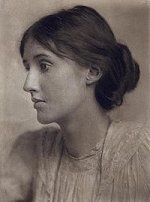 Virginia Woolf
Virginia Woolf
(1882-1941)
7. Kew Gardens
(from: Monday or Tuesday)
From the oval-shaped flower-bed there rose perhaps a hundred stalks spreading into heart-shaped or tongue-shaped leaves half way up and unfurling at the tip red or blue or yellow petals marked with spots of colour raised upon the surface; and from the red, blue or yellow gloom of the throat emerged a straight bar, rough with gold dust and slightly clubbed at the end. The petals were voluminous enough to be stirred by the summer breeze, and when they moved, the red, blue and yellow lights passed one over the other, staining an inch of the brown earth beneath with a spot of the most intricate colour.
The light fell either upon the smooth, grey back of a pebble, or, the shell of a snail with its brown, circular veins, or falling into a raindrop, it expanded with such intensity of red, blue and yellow the thin walls of water that one expected them to burst and disappear. Instead, the drop was left in a second silver grey once more, and the light now settled upon the flesh of a leaf, revealing the branching thread of fibre beneath the surface, and again it moved on and spread its illumination in the vast green spaces beneath the dome of the heart-shaped and tongue-shaped leaves. Then the breeze stirred rather more briskly overhead and the colour was flashed into the air above, into the eyes of the men and women who walk in Kew Gardens in July.
The figures of these men and women straggled past the flower-bed with a curiously irregular movement not unlike that of the white and blue butterflies who crossed the turf in zig-zag flights from bed to bed. The man was about six inches in front of the woman, strolling carelessly, while she bore on with greater purpose, only turning her head now and then to see that the children were not too far behind. The man kept this distance in front of the woman purposely, though perhaps unconsciously, for he wished to go on with his thoughts.
“Fifteen years ago I came here with Lily,” he thought. “We sat somewhere over there by a lake and I begged her to marry me all through the hot afternoon. How the dragonfly kept circling round us: how clearly I see the dragonfly and her shoe with the square silver buckle at the toe. All the time I spoke I saw her shoe and when it moved impatiently I knew without looking up what she was going to say: the whole of her seemed to be in her shoe. And my love, my desire, were in the dragonfly; for some reason I thought that if it settled there, on that leaf, the broad one with the red flower in the middle of it, if the dragonfly settled on the leaf she would say “Yes” at once. But the dragonfly went round and round: it never settled anywhere — of course not, happily not, or I shouldn’t be walking here with Eleanor and the children — Tell me, Eleanor. D’you ever think of the past?”
“Why do you ask, Simon?”
“Because I’ve been thinking of the past. I’ve been thinking of Lily, the woman I might have married . . . Well, why are you silent? Do you mind my thinking of the past?”
“Why should I mind, Simon? Doesn’t one always think of the past, in a garden with men and women lying under the trees? Aren’t they one’s past, all that remains of it, those men and women, those ghosts lying under the trees . . . one’s happiness, one’s reality?”
“For me, a square silver shoe buckle and a dragonfly —”
“For me, a kiss. Imagine six little girls sitting before their easels twenty years ago, down by the side of a lake, painting the water-lilies, the first red water-lilies I’d ever seen. And suddenly a kiss, there on the back of my neck. And my hand shook all the afternoon so that I couldn’t paint. I took out my watch and marked the hour when I would allow myself to think of the kiss for five minutes only — it was so precious — the kiss of an old grey-haired woman with a wart on her nose, the mother of all my kisses all my life. Come, Caroline, come, Hubert.”
They walked on the past the flower-bed, now walking four abreast, and soon diminished in size among the trees and looked half transparent as the sunlight and shade swam over their backs in large trembling irregular patches.
In the oval flower bed the snail, whose shelled had been stained red, blue, and yellow for the space of two minutes or so, now appeared to be moving very slightly in its shell, and next began to labour over the crumbs of loose earth which broke away and rolled down as it passed over them. It appeared to have a definite goal in front of it, differing in this respect from the singular high stepping angular green insect who attempted to cross in front of it, and waited for a second with its antenna trembling as if in deliberation, and then stepped off as rapidly and strangely in the opposite direction. Brown cliffs with deep green lakes in the hollows, flat, blade-like trees that waved from root to tip, round boulders of grey stone, vast crumpled surfaces of a thin crackling texture — all these objects lay across the snail’s progress between one stalk and another to his goal. Before he had decided whether to circumvent the arched tent of a dead leaf or to breast it there came past the bed the feet of other human beings.
This time they were both men. The younger of the two wore an expression of perhaps unnatural calm; he raised his eyes and fixed them very steadily in front of him while his companion spoke, and directly his companion had done speaking he looked on the ground again and sometimes opened his lips only after a long pause and sometimes did not open them at all. The elder man had a curiously uneven and shaky method of walking, jerking his hand forward and throwing up his head abruptly, rather in the manner of an impatient carriage horse tired of waiting outside a house; but in the man these gestures were irresolute and pointless. He talked almost incessantly; he smiled to himself and again began to talk, as if the smile had been an answer. He was talking about spirits — the spirits of the dead, who, according to him, were even now telling him all sorts of odd things about their experiences in Heaven.
“Heaven was known to the ancients as Thessaly, William, and now, with this war, the spirit matter is rolling between the hills like thunder.” He paused, seemed to listen, smiled, jerked his head and continued:—
“You have a small electric battery and a piece of rubber to insulate the wire — isolate? — insulate? — well, we’ll skip the details, no good going into details that wouldn’t be understood — and in short the little machine stands in any convenient position by the head of the bed, we will say, on a neat mahogany stand. All arrangements being properly fixed by workmen under my direction, the widow applies her ear and summons the spirit by sign as agreed. Women! Widows! Women in black —”
Here he seemed to have caught sight of a woman’s dress in the distance, which in the shade looked a purple black. He took off his hat, placed his hand upon his heart, and hurried towards her muttering and gesticulating feverishly. But William caught him by the sleeve and touched a flower with the tip of his walking-stick in order to divert the old man’s attention. After looking at it for a moment in some confusion the old man bent his ear to it and seemed to answer a voice speaking from it, for he began talking about the forests of Uruguay which he had visited hundreds of years ago in company with the most beautiful young woman in Europe. He could be heard murmuring about forests of Uruguay blanketed with the wax petals of tropical roses, nightingales, sea beaches, mermaids, and women drowned at sea, as he suffered himself to be moved on by William, upon whose face the look of stoical patience grew slowly deeper and deeper.
Following his steps so closely as to be slightly puzzled by his gestures came two elderly women of the lower middle class, one stout and ponderous, the other rosy cheeked and nimble. Like most people of their station they were frankly fascinated by any signs of eccentricity betokening a disordered brain, especially in the well-to-do; but they were too far off to be certain whether the gestures were merely eccentric or genuinely mad. After they had scrutinised the old man’s back in silence for a moment and given each other a queer, sly look, they went on energetically piecing together their very complicated dialogue:
“Nell, Bert, Lot, Cess, Phil, Pa, he says, I says, she says, I says, I says, I says —”
“My Bert, Sis, Bill, Grandad, the old man, sugar, Sugar, flour, kippers, greens, Sugar, sugar, sugar.”
The ponderous woman looked through the pattern of falling words at the flowers standing cool, firm, and upright in the earth, with a curious expression. She saw them as a sleeper waking from a heavy sleep sees a brass candlestick reflecting the light in an unfamiliar way, and closes his eyes and opens them, and seeing the brass candlestick again, finally starts broad awake and stares at the candlestick with all his powers. So the heavy woman came to a standstill opposite the oval-shaped flower bed, and ceased even to pretend to listen to what the other woman was saying. She stood there letting the words fall over her, swaying the top part of her body slowly backwards and forwards, looking at the flowers. Then she suggested that they should find a seat and have their tea.
The snail had now considered every possible method of reaching his goal without going round the dead leaf or climbing over it. Let alone the effort needed for climbing a leaf, he was doubtful whether the thin texture which vibrated with such an alarming crackle when touched even by the tip of his horns would bear his weight; and this determined him finally to creep beneath it, for there was a point where the leaf curved high enough from the ground to admit him. He had just inserted his head in the opening and was taking stock of the high brown roof and was getting used to the cool brown light when two other people came past outside on the turf. This time they were both young, a young man and a young woman. They were both in the prime of youth, or even in that season which precedes the prime of youth, the season before the smooth pink folds of the flower have burst their gummy case, when the wings of the butterfly, though fully grown, are motionless in the sun.
“Lucky it isn’t Friday,” he observed.
“Why? D’you believe in luck?”
“They make you pay sixpence on Friday.”
“What’s sixpence anyway? Isn’t it worth sixpence?”
“What’s ‘it’— what do you mean by ‘it’?”
“O, anything — I mean — you know what I mean.”
Long pauses came between each of these remarks; they were uttered in toneless and monotonous voices. The couple stood still on the edge of the flower bed, and together pressed the end of her parasol deep down into the soft earth. The action and the fact that his hand rested on the top of hers expressed their feelings in a strange way, as these short insignificant words also expressed something, words with short wings for their heavy body of meaning, inadequate to carry them far and thus alighting awkwardly upon the very common objects that surrounded them, and were to their inexperienced touch so massive; but who knows (so they thought as they pressed the parasol into the earth) what precipices aren’t concealed in them, or what slopes of ice don’t shine in the sun on the other side? Who knows? Who has ever seen this before? Even when she wondered what sort of tea they gave you at Kew, he felt that something loomed up behind her words, and stood vast and solid behind them; and the mist very slowly rose and uncovered — O, Heavens, what were those shapes? — little white tables, and waitresses who looked first at her and then at him; and there was a bill that he would pay with a real two shilling piece, and it was real, all real, he assured himself, fingering the coin in his pocket, real to everyone except to him and to her; even to him it began to seem real; and then — but it was too exciting to stand and think any longer, and he pulled the parasol out of the earth with a jerk and was impatient to find the place where one had tea with other people, like other people.
“Come along, Trissie; it’s time we had our tea.”
“Wherever does one have one’s tea?” she asked with the oddest thrill of excitement in her voice, looking vaguely round and letting herself be drawn on down the grass path, trailing her parasol, turning her head this way and that way, forgetting her tea, wishing to go down there and then down there, remembering orchids and cranes among wild flowers, a Chinese pagoda and a crimson crested bird; but he bore her on.
Thus one couple after another with much the same irregular and aimless movement passed the flower-bed and were enveloped in layer after layer of green blue vapour, in which at first their bodies had substance and a dash of colour, but later both substance and colour dissolved in the green-blue atmosphere. How hot it was! So hot that even the thrush chose to hop, like a mechanical bird, in the shadow of the flowers, with long pauses between one movement and the next; instead of rambling vaguely the white butterflies danced one above another, making with their white shifting flakes the outline of a shattered marble column above the tallest flowers the glass roofs of the palm house shone as if a whole market full of shiny green umbrellas had opened in the sun; and in the drone of the aeroplane the voice of the summer sky murmured its fierce soul. Yellow and black, pink and snow white, shapes of all these colours, men, women, and children were spotted for a second upon the horizon, and then, seeing the breadth of yellow that lay upon the grass, they wavered and sought shade beneath the trees, dissolving like drops of water in the yellow and green atmosphere, staining it faintly with red and blue. It seemed as if all gross and heavy bodies had sunk down in the heat motionless and lay huddled upon the ground, but their voices went wavering from them as if they were flames lolling from the thick waxen bodies of candles. Voices. Yes, voices. Wordless voices, breaking the silence suddenly with such depth of contentment, such passion of desire, or, in the voices of children, such freshness of surprise; breaking the silence? But there was no silence; all the time the motor omnibuses were turning their wheels and changing their gear; like a vast nest of Chinese boxes all of wrought steel turning ceaselessly one within another the city murmured; on the top of which the voices cried aloud and the petals of myriads of flowers flashed their colours into the air.

Monday or Tuesday, by Virginia Woolf
7. Kew Gardens
fleursdumal.nl magazine
More in: - Monday or Tuesday, Archive W-X, Woolf, Virginia
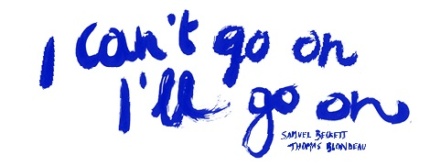
AN’T GO ON, I’LL GO ON. Of ook wel: “Beseffen dat de situatie hopeloos is, en toch niet opgeven. Dat is de condition humaine.” Rake motto’s van Thomas Blondeau.
Thomas Blondeau (Poperinge, 21 juni 1978 – aldaar, 20 oktober 2013) was een Vlaamse schrijver, dichter en journalist. Hij studeerde aan de Katholieke Universiteit Leuven en aan de Universiteit Leiden (literatuurwetenschappen). Thomas Blondeau schreef voor onder andereMare, Deng, De Revisor en Dif.
Na vele poëzievoordrachten en gepubliceerde korte verhalen, verscheen in 2006 zijn debuutroman eX, die met name in België goed ontvangen werd. Begin 2010 verscheen zijn tweede roman, Donderhart.
Thomas Blondeau overleed op 20 oktober 2013 onverwacht aan een hartslagaderbreuk in zijn geboorteplaats Poperinge.
IJSBERG #2 wordt een warme literaire herinneringsavond rond Thomas Blondeau, schrijver, dichter en columnist en twee jaar geleden veel te vroeg overleden. Op 24 oktober worden de kamers in het Festivalhuis ingevuld met woord en beeld van Thomas, gaat om 19u30 een avondprogramma van start en bent u welkom in onze bar om een glas op hem te heffen.
Er verzamelden zich reeds heel wat (schrijvers)vrienden van Thomas Blondeau om een goedgevuld avondprogramma en eresaluut te brengen: Jelle Van Riet, Roderik Six, Jef Staes, Liesbet Waegemans, Iris Koppe, Ramsey Nasr, Ellen Deckwitz, Frederik Willem Daem doen alvast hun ding. G A U S S zorgt voor muziek.
24 oktober 2015 – 19u – deuren open – Festivalhuis Watou, Watouplein 12, Watou BE
19u30 – start avondprogramma met Jelle Van Riet, Jef Staes, Frederik Willem Daem, Liesbet Waegemans, Roderik Six en vele anderen.
21u – we heffen het glas op Thomas en daarna is de bar en het festivalhuis met video, beeld en geluid doorlopend open
Gratis toegang, inschrijven gewenst via liesbet.daeninck@vzwkunst.be.
# Meer informatie op Website Kunstenfestival Watou
fleursdumal.nl magazine
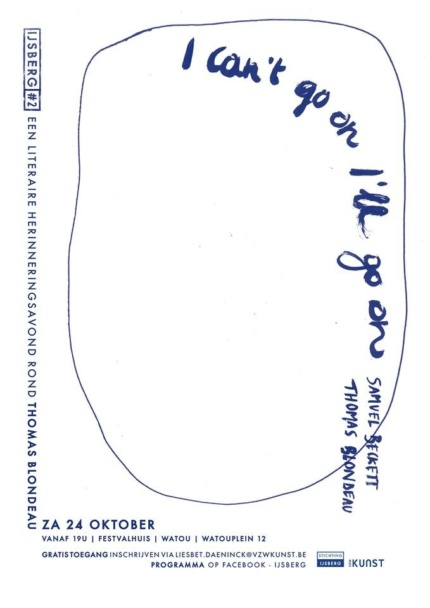
More in: Art & Literature News, In Memoriam, Thomas Blondeau, Watou Kunstenfestival
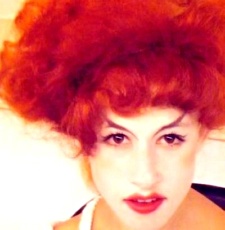 Verplaatsen en serieus genomen worden
Verplaatsen en serieus genomen worden
Productiehuis prod.nu is een nieuw programma begonnen: Speeches. In dit programma houden zes mensen een speech van zes minuten. Elke maand is er een ander thema en de kern van de avonden is: ‘Over het genot van het spreken in eenrichtingsverkeer.’ 12 september vond de eerste editie plaats met als thema: de reis. Vanaf nu zal het programma iedere eerste vrijdag van de maand plaatsvinden in Theater de Nieuwe Vorst te Tilburg. Bedoeling is dat het programma ook gaat reizen door het land, en ik ben een van hun vaste schrijvers.
Dit is de toespraak die ik die avond heb gehouden:
Op mijn vierde emigreerde ik met mijn ouders naar Australië. We zouden regelmatig terugkomen in Nederland en we zouden uiteindelijk op mijn dertiende weer permanent in Nederland gaan wonen, dus in feite was het eerder een hele luxe verhuizing naar een tweede huis.
Van het eerste jaar kleuterklas, op een Montessorischool vol VPRO-kinderen, in Amsterdam ging ik naar het Britse klassikaal onderwijs in Adelaide inclusief schooluniform en juffen die stokken vasthielden en de letters op het bord mijn hoofd in timmerden. Ik sprak nog geen Engels maar ik vond het er geweldig, en binnen een paar maanden tijd was mijn Engels net zo goed als mijn Nederlands.
Australië is een enorme smeltkroes, en ook op de school zaten heel veel kinderen met verschillende nationaliteiten. Er waren Italianen, Grieken, Chinezen, Indonesiërs, Turken, er was een meisje uit Fiji, er zaten Aboriginalkinderen op de school en ook kinderen die waren gevlucht uit Iran en andere Midden-Oosterse landen. Veel kinderen kwamen uit moeilijke omstandigheden, ik niet, maar ik was dan ook geen vluchteling. Ik was het Nederlandse meisje en ik kreeg vaak de vraag: Do you live in a windmill? Of: Why aren’t you wearing cloggs?
Als we zo af en toe terug waren in Nederland dan ging ik hier weer naar school.
Ik had in beide landen vriendjes en vriendinnetjes maar in Nederland werd ik heel erg gepest. In eerste instantie werd ik gepest omdat ik zo klein was (ben), maar het kwam voornamelijk door mijn opdonderigheid; ik hapte altijd.
Ik werd elke dag wel uitgescholden voor lelijke trol, klein kutkind of stomme dwerg. Toen ik later bij mijn grootste pester in de middelbare schoolklas belandde werd het alleen maar erger. Hij had gehoord dat ik een vriendje had en vroeg meteen: ‘is hij blind ofzo?’
Kijk, ik deed er ook weinig aan om het pesten te stoppen. Aan docenten had ik bijna niets, die zagen het niet of pakten het onhandig aan, door bijvoorbeeld tegen de pester te zeggen dat ik huilend aan was komen zetten.. natuurlijk het laatste wat je moet doen. Ik had altijd een weerwoord klaar, kwam voor mijzelf op en vertikte het om niet serieus genomen te worden.
Hierdoor bezit ik denk ik nog altijd de onverwoestbare drang om serieus genomen te worden en op te komen voor diegene die niet serieus genomen wordt. Ook heb ik een, wellicht overgevoelige, radar voor situaties waarin mensen onterecht in een slachtofferrol worden geplaatst; met goede bedoelingen een ander mens totaal niet serieus nemen.
Vanochtend zag ik een foto op Facebook verschijnen van een spandoek met daarop geschreven: ‘Treating refugees as the problem IS the problem.’
Daarna las ik met een schuin oog een tirade van een man die zich verwonderde over de hoeveelheid smartphones en selfiesticks van de bootvluchtelingen. Daarna las ik de handleiding van gastgezinvoorvluchteling.nl.
Een greep uit die handleiding:
1. U wordt gekoppeld aan een vluchteling uit de Americahal, uw vriend is nog maar kort in Nederland.
2. U kunt de wifi-code geven aan uw vriend, zodat hij ook toegang heeft tot het internet.
3. Uit respect voor mensen met een moslimachtergrond en voor de duidelijkheid is het beste om iets met kip en (Basmati) rijst te maken. Grote kans dat uw vriend dit lekker vindt.
Toen begonnen mijn billen een beetje te jeuken van ongemak.
Vluchtelingen zijn geen zielige hulpeloze peuters die de oversteek vanuit 1789 naar 2015 hebben gemaakt. Natuurlijk hebben ze smartphones! Zijn ze daardoor niet vluchtelingerig genoeg voor de social media?
Het zijn op dit moment over het algemeen redelijk opgeleide jonge volwassen mannen die ook opgegroeid zijn met internet, heel precies weten waar ze naartoe willen, hoopvol zijn gemaakt met iets te mooie verhalen over Noord-Europa en, afhankelijk van waar ze vandaan komen, veilig willen zijn of een beter leven wensen.
Dit zijn geen zielige naïeve poppetjes. Dit zijn artsen, geneeskundestudenten, advocaten, vaders, loodgieters, ingenieurs en schrijvers die het risico dat ze doodgaan tijdens de overtocht op de koop toe nemen. Ze zijn enorm zelfstandig en moedig!
Zitten er mensen tussen die helemaal geen onveilig land ontvluchten maar gewoonweg een beter leven willen en geld willen sturen naar hun achtergebleven familie? Vast wel. Is dat zo erg om te zeggen? Waarom? Het zijn mensen. Doodgewone mensen zoals jij en ik, aardige en onaardige mensen. Hetgeen waar de vluchtelingen om vluchten is hun vrijheid; hun menselijkheid. Behandel hen dan ook menselijk. Menselijk betekent niet als jonge hongerige puppy’s, maar als volwaardige, autonome en weldenkende mensen. Als je hen die vrijheid ontneemt dan neem je hen niet serieus en dat is, mijns inziens, het ergste wat je kan doen.
In Australië was iedereen vreemd maar iedereen was Australiër, ook ik. Eerst dacht ik dat het aan mijn kansrijke achtergrond lag, dat ik daarom zo vroeg al goed Engels sprak, of dat het aan mijn vrije opvoeding lag waardoor ik als Joods meisje toch gewoon meedeed aan de kerstviering in het traditionele Australië. Maar nee, het lag niet aan mij. De echte immigrantenkinderen en de kinderen van vluchtelingen deden precies hetzelfde, ongeacht afkomst.
Ze spraken allemaal goed Engels, ook de ouders, en geen enkel moslimvriendinnetje droeg een hoofddoek.
Iedereen werd daar toen serieus genomen, maar er werd ook iets verwacht: aanpassingsvermogen en autonomie. De situatie in Australië is nu wel wat veranderd, hun immigratieregeling is streng geworden. Toch is de samenleving daar een goed voorbeeld. Als het daar kan, kan het hier dan ook?
Wellicht als we mensen blijven zien als mensen, dat betekent dus zonder onnodige veroordeling maar ook zonder luizenmoederig medelijden.
Esther Porcelijn
# Meer op de website van Esther Porcelijn
fleursdumal.nl magazine
More in: MONTAIGNE, Porcelijn, Esther, Porcelijn, Esther, The talk of the town
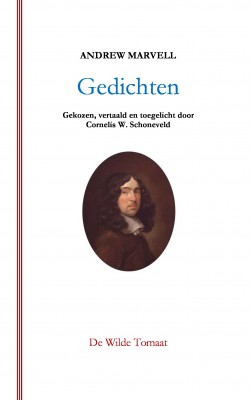 Het werk van de Engelse dichter Andrew Marvell (1621-1678) staat tegenwoordig misschien wel meer in de belangstelling dan dat van zijn grote voorgangers Donne en Herbert. Marvells tijdgenoten kenden zijn werk nauwelijks; de eerste uitgave ervan verscheen pas drie jaar na zijn dood.
Het werk van de Engelse dichter Andrew Marvell (1621-1678) staat tegenwoordig misschien wel meer in de belangstelling dan dat van zijn grote voorgangers Donne en Herbert. Marvells tijdgenoten kenden zijn werk nauwelijks; de eerste uitgave ervan verscheen pas drie jaar na zijn dood.
Vertaler Cornelis W. Schoneveld schrijft in zijn inleiding over Marvells intrigerende leven en werk, en hij poneert, na eigen onderzoek, de stelling dat de dichter tijdens zijn verblijf in Nederland van 1662 tot 1663 niet als spion werkte zoals men steeds aanneemt, maar Engels onderwees aan de 12-jarige prins Willem III, neefje van koning Karel II, en later stadhouder van de Republiek en koning van Engeland.
Behalve beroemde gedichten als The Garden en To His Coy Mistress zijn ook de meeste andere lyrische en verhalende gedichten opgenomen, evenals Marvells eerste politieke satire The Character of Holland (1653). Aan alle gaat een korte toelichting vooraf, met daarnaast een fraaie passende afbeelding. De vertalingen houden zich nauwkeurig aan de gevarieerde versvormen die Marvell met zoveel zorg toepaste.
Andrew Marvell: Gedichten. Gekozen, vertaald en toegelicht door Cornelis W. Schoneveld. Tweetalige uitgave. 165 pagina’s; afmetingen: 15x200x125 mm, ISBN: 978 90 820255 8 3, prijs € 20,-
fleursdumal.nl magazine
More in: - Book News, Archive M-N, Art & Literature News, POETRY IN TRANSLATION: SCHONEVELD, TRANSLATION ARCHIVE
Thank you for reading Fleurs du Mal - magazine for art & literature